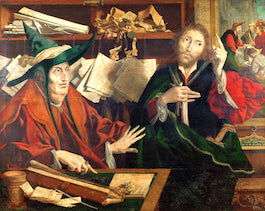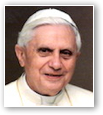God or Nothing
- BENEDICT XVI
The Gospel (Luke 16: 1-8) does not present [the steward] as a model to follow in his dishonesty, but as an example to be imitated for his farsighted guile….
 But what does Jesus wish to tell us with this parable? And with its surprising conclusion? The Evangelist follows the parable of the dishonest steward with a short series of sayings and recommendations on the relationship we must have with money and the goods of this earth. These short sentences are an invitation to a choice that presupposes a radical decision, a constant inner tension. Life is truly always a choice: between honesty and dishonesty, between fidelity and infidelity, between selfishness and altruism, between good and evil. The conclusion of this Gospel passage (v. 13) is incisive and peremptory: No servant can serve two masters; for either he will hate the one and love the other, or he will be devoted to the one and despise the other. Ultimately, Jesus says, you cannot serve God and mammon.... We might say that riches are shown as the idol to which everything is sacrificed in order to attain one's own material success; hence, this economic success becomes a person's true god. As a result, it is necessary to make a fundamental decision between God and mammon....
But what does Jesus wish to tell us with this parable? And with its surprising conclusion? The Evangelist follows the parable of the dishonest steward with a short series of sayings and recommendations on the relationship we must have with money and the goods of this earth. These short sentences are an invitation to a choice that presupposes a radical decision, a constant inner tension. Life is truly always a choice: between honesty and dishonesty, between fidelity and infidelity, between selfishness and altruism, between good and evil. The conclusion of this Gospel passage (v. 13) is incisive and peremptory: No servant can serve two masters; for either he will hate the one and love the other, or he will be devoted to the one and despise the other. Ultimately, Jesus says, you cannot serve God and mammon.... We might say that riches are shown as the idol to which everything is sacrificed in order to attain one's own material success; hence, this economic success becomes a person's true god. As a result, it is necessary to make a fundamental decision between God and mammon....
Basically, it is a matter of choosing between selfishness and love, between justice and dishonesty and ultimately, between God and Satan. If loving Christ and one's brethren is not to be considered as something incidental and superficial but, rather, the true and ultimate purpose of our whole existence, it will be necessary to know how to make basic choices, to be prepared to make radical renouncements, if necessary even to the point of martyrdom. Today, as yesterday, Christian life demands the courage to go against the tide, to love like Jesus, who even went so far as to sacrifice himself on the cross. We could then say, paraphrasing one of Saint Augustine's thoughts, that through earthly riches we must procure for ourselves those true and eternal riches: indeed, if people exist who are prepared to resort to every type of dishonesty to assure themselves an always unpredictable material well-being, how much more concerned we Christians must be to provide for our eternal happiness with the goods of this earth.
 This is Meaghen Gonzalez, Editor of CERC. I hope you appreciated this piece. We curate these articles especially for believers like you.
This is Meaghen Gonzalez, Editor of CERC. I hope you appreciated this piece. We curate these articles especially for believers like you.
Please show your appreciation by making a $3 donation. CERC is entirely reader supported.

Acknowledgement
 Pope Benedict XVI. "God or Nothing." from Pastoral Visit of Pope Benedict XVI, Eucharistic Concelebration, St. Clement's Square, Rome, Italy, September 23, 2007.
Pope Benedict XVI. "God or Nothing." from Pastoral Visit of Pope Benedict XVI, Eucharistic Concelebration, St. Clement's Square, Rome, Italy, September 23, 2007.
Reprinted with permission of Libreria Editrice Vaticana.
The Author

 Pope Benedict XVI is the author of Jesus of Nazareth, Vol II, Jesus of Nazareth, Vol I, Caritas in Veritate: Charity in Truth, Saved in Hope: Spe Salvi, God Is Love: Deus Caritas Est,The End of Time?: The Provocation of Talking about God, Truth and Tolerance: Christian Belief and World Religions, Without Roots: The West, Relativism, Christianity, Islam, Salt of the Earth: An Exclusive Interview on the State of the Church at the End of the Millennium, God and the World: Believing and Living in Our Time, In the Beginning: A Catholic Understanding of the Story of Creation and the Fall, The Spirit of the Liturgy, The Ratzinger Report: An Exclusive Interview on the State of the Church, Introduction to the Catechism of the Catholic Church, Introduction to Christianity, Called to Communion: Understanding the Church Today, Milestones: Memoirs 1927-1977, Behold the Pierced One, and God Is Near Us: The Eucharist, the Heart of Life.
Pope Benedict XVI is the author of Jesus of Nazareth, Vol II, Jesus of Nazareth, Vol I, Caritas in Veritate: Charity in Truth, Saved in Hope: Spe Salvi, God Is Love: Deus Caritas Est,The End of Time?: The Provocation of Talking about God, Truth and Tolerance: Christian Belief and World Religions, Without Roots: The West, Relativism, Christianity, Islam, Salt of the Earth: An Exclusive Interview on the State of the Church at the End of the Millennium, God and the World: Believing and Living in Our Time, In the Beginning: A Catholic Understanding of the Story of Creation and the Fall, The Spirit of the Liturgy, The Ratzinger Report: An Exclusive Interview on the State of the Church, Introduction to the Catechism of the Catholic Church, Introduction to Christianity, Called to Communion: Understanding the Church Today, Milestones: Memoirs 1927-1977, Behold the Pierced One, and God Is Near Us: The Eucharist, the Heart of Life.




